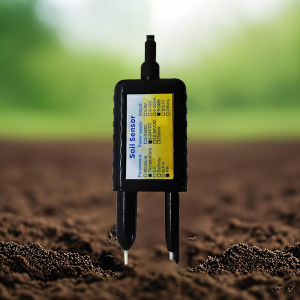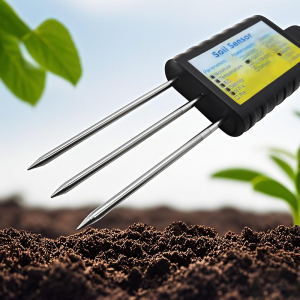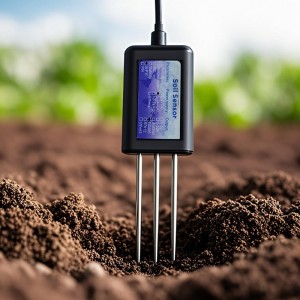I lalo o le talaaga o le vave o le atinaʻeina o faʻatoʻaga i aso nei, o le mataʻituina ma le puleaina o le lelei o le eleele ua avea ma se sootaga taua e faʻateleina ai le fua o faʻatoʻaga ma faʻaleleia atili ai le vaevaeina o punaoa. Faatasi ai ma le alualu i luma faifai pea o tekinolosi, ua aliaʻe mai ai masini suʻesuʻe eleele, ma maua ai se fofo fou mo faifaʻatoʻaga ma pule o faʻatoʻaga. O lenei tusiga o le a faʻalauiloa atu ai le mataupu faavae o le galue, galuega autu ma faʻamoemoega o le faʻaaogaina o masini suʻesuʻe eleele i faʻatoʻaga, e fesoasoani ia te oe e malamalama atili ai i le taua o lenei tekinolosi fou.
O le ā le masini su'esu'e eleele?
O se masini su'esu'e eleele o se masini atamai e fa'aaogaina mo le mata'ituina moni o le siosiomaga o le eleele. E mafai ona aoina mai fa'amatalaga eseese i le eleele, e aofia ai le susu o le eleele, le vevela, le taua o le pH, le eletise e tafe ai le eletise ma le aofa'i o mea'ai, ma isi mea fa'apena. O nei masini su'esu'e e feso'ota'i i le faiga e pulea ai le eleele e ala i feso'ota'iga uaealesi, e mafai ai e faifa'ato'aga ona maua fa'amatalaga i tulaga o le eleele i so'o se taimi ma so'o se mea, ma faia ai fa'ai'uga fa'asaienisi.
2. O galuega autū a masini su'esu'e eleele
Mata'ituina i le taimi moni
E mafai e masini e iloa ai le eleele ona faʻagaoioia pea mo le 24 itula, e maua ai suiga moni i le taimi moni o faʻailoga eseese o le eleele, e fesoasoani ai i faifaʻatoʻaga ia malamalama vave i tulaga o le eleele ma ʻalofia ai le leiloa e mafua mai i le tuai o faʻamatalaga.
Su'esu'ega o fa'amaumauga
O le tele o masini e iloa ai le eleele ua fa'apipi'iina i ni galuega malolosi e iloilo ai fa'amaumauga, e mafai ona iloiloina ma fa'agasolo fa'amaumauga ua aoina e faia ai ni lipoti vaaia, ma mafai ai e faifa'ato'aga ona maua se malamalamaga sili atu ona malamalama i le tulaga o le soifua maloloina o le eleele.
Fa'ailo otometi
A sili atu fa'ailoga o le eleele i le tulaga faatulagaina, e mafai e le masini fa'alogo ona otometi lava ona fa'aalia se fa'ailo e fa'amanatu ai i faifa'ato'aga e faia ni fuafuaga vave, e pei o le fetu'una'i o le tele o le fa'asūsūina po'o auala fa'apalaina, e puipuia ai fa'ato'aga mai le fa'aleagaina.
Mata'ituina mamao
E ala i telefoni feaveaʻi poʻo komepiuta, e mafai ai e faifaʻatoʻaga ona siaki faʻamatalaga o loʻo toe faʻafoʻi mai e masini suʻesuʻe o le eleele i soʻo se taimi, faia le mataʻituina mamao, ma sefe ai le taimi ma le tau o galuega o asiasiga i le nofoaga.
3. Tulaga lelei o masini su'esu'e eleele
Fa'ateleina le fua o fa'ato'aga
Faatasi ai ma le fesoasoani a faʻamaumauga i le taimi moni, e mafai ai e faifaʻatoʻaga ona pulea lelei le vai ma meaʻai, ma faʻaleleia atili ai le lelei o le tuputupu aʻe ma le fua o faʻatoʻaga.
Se'i fa'asaoina punaoa
O le fa'apalaina ma le fa'asūsūina sa'o e mafai ona fa'aitiitia ai le fa'ama'imauina o le vai ma fa'apalaina vaila'au, fa'aitiitia ai tau o gaosiga fa'ato'aga, ma i ai se aafiaga lelei i le puipuiga o le si'osi'omaga i le taimi e tasi.
Fa'aleleia le onosa'i
O le mataʻituina o le tulaga maloloina o le eleele, e mafai ai e faifaʻatoʻaga ona malamalama vave i le siosiomaga e ola ai a latou faʻatoʻaga, faʻatulaga ni auala talafeagai e pulea ai, ma faʻaleleia atili ai le mafai e faʻatoʻaga ona teteʻe atu i manu faʻalafua, faʻamaʻi ma suiga o le tau.
Lagolago fa'ato'aga gafataulimaina
E maua mai i masini e iloa ai le eleele le lagolago fa'apitoa mo le ausiaina o atina'e gafataulimaina ma e mafai ona fesoasoani i faifa'ato'aga e fa'apaleni lelei ai aogā tau tamaoaiga ma le puipuiga o le si'osi'omaga i le gaosiga.
4. Le lautele o le faʻaaogaina o masini suʻesuʻe eleele
Fa'ato'aga sa'o
O masini e iloa ai le eleele o meafaigaluega autū ia o faiga faatoʻaga saʻo, e fesoasoani i faifaatoʻaga e faatulaga fuafuaga tau pulega patino e faavae i manaoga moni ma faaleleia atili ai le lelei o le gaosiga.
Suʻesuʻega Faasaienisi ma Aʻoaʻoga
I matāʻupu o suʻesuʻega faʻatoʻaga ma aʻoaʻoga, e faʻaaogaina lautele masini e iloa ai le eleele i faʻataʻitaʻiga ma aʻoaʻoga, e maua ai e tamaiti aʻoga ma tagata suʻesuʻe faʻamaumauga moni ma faʻavae faʻataʻitaʻiga.
Fa'ato'aga i le taulaga
I fa'ato'aga i totonu o taulaga ma fa'ato'aga fa'ale-nu'u, e mafai e masini e iloa ai le eleele ona fesoasoani i tagata o lo'o nonofo i taulaga ia malamalama i tulaga o le eleele i le taimi moni, fa'aleleia atili le puleaina o togālaau faisua, ma fa'alauiloa le atina'eina o avanoa lanumeamata i totonu o taulaga.
Mata'ituina o le siosiomaga
Mo ofisa o le puipuiga o le siʻosiʻomaga, o masini e iloa ai le eleele o ni meafaigaluega taua mo le mataʻituina o le faʻaleagaina o le eleele ma suiga, e fesoasoani e iloilo ai le tulaga o le soifua maloloina o le siʻosiʻomaga faʻalenatura ma lagolago ai le pulega o le siʻosiʻomaga ma taumafaiga e toe faʻaleleia ai.
Faaiuga
Faatasi ai ma le faamamafa a le lalolagi atoa i le saogalemu o meaai ma le atinae gafataulimaina, e le gata mai avanoa e faaaoga ai masini su'esu'e eleele. E le gata ina mafai ona faaleleia atili ai le lelei o le gaosiga o faatoaga, ae maua ai foi e faifaatoaga ni auala atamai ma faasaienisi e pulea ai. I le faalauiloaina o masini su'esu'e eleele, se'i o tatou galulue faatasi e fesoasoani i le ausiaina o le gaosiga o faatoaga e sili atu ona lelei ma e le afaina ai le siosiomaga.
Afai e te fia iloa atili e uiga i faʻaoga patino poʻo faʻamatalaga faʻatau o masini suʻesuʻe eleele, faʻamolemole faʻafesoʻotaʻi matou i soʻo se taimi. Matou te tulimatai atu i le galulue faʻatasi ma oe e fausia faʻatasi se lumanaʻi manuia mo faʻatoʻaga atamai!
Taimi na lafoina ai: Aperila-21-2025




